
Zork is a text-based adventure game first released in 1977 by developers Tim Anderson, Marc Blank, Bruce Daniels, and Dave Lebling for the PDP-10 mainframe computer. The original developers and others, as the company Infocom, expanded and split the game into three titles—Zork I: The Great Underground Empire, Zork II: The Wizard of Frobozz, and Zork III: The Dungeon Master—which were released commercially for a range of personal computers beginning in 1980. In Zork, the player explores the abandoned Great Underground Empire in search of treasure. The player moves between the game's hundreds of locations and interacts with objects by typing commands in natural language that the game interprets. The program acts as a narrator, describing the player's location and the results of the player's commands. It has been described as the most famous piece of interactive fiction.
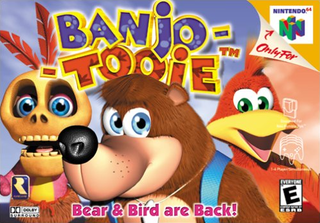
Banjo-Tooie is a platform video game developed by Rare and originally released for the Nintendo 64 console in 2000. It is the second game in the Banjo-Kazooie series and the sequel to Banjo-Kazooie. The game follows the returning protagonists Banjo and Kazooie as they attempt to stop the plans of the witch Gruntilda and two of her sisters, who intend to vaporise the inhabitants of the game's island setting. The game features worlds significantly larger than those of its predecessor, requiring the player to complete challenges such as solving puzzles, jumping over obstacles, collecting items, and defeating opponents. It also includes a multiplayer mode in which up to four players can compete in several minigames repurposed from the main campaign.

A role-playing video game, commonly referred to as a role-playing game (RPG) or computer role-playing game (CRPG), is a video game genre where the player controls the actions of a character immersed in some well-defined world, usually involving some form of character development by way of recording statistics. Many role-playing video games have origins in tabletop role-playing games and use much of the same terminology, settings and game mechanics. Other major similarities with pen-and-paper games include developed story-telling and narrative elements, player character development, complexity, as well as replay value and immersion. The electronic medium removes the necessity for a gamemaster and increases combat resolution speed. RPGs have evolved from simple text-based console-window games into visually rich 3D experiences.
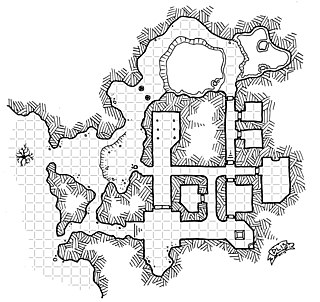
A dungeon crawl is a type of scenario in fantasy role-playing games (RPGs) in which heroes navigate a labyrinth environment, battling various monsters, avoiding traps, solving puzzles, and looting any treasure they may find. Video games and board games which predominantly feature dungeon crawl elements are considered to be a genre.

Nox is an action role-playing game developed and published by Westwood Studios and Electronic Arts in 2000 for Microsoft Windows. It details the story of Jack, a young man from Earth who is pulled into a high fantasy parallel universe and has to defeat the evil sorceress Hecubah and her army of necromancers to return home. Depending on the player's choice of character class at the beginning of the game, the game follows three largely different linear storylines, each leading to its unique ending. In the multiplayer, players can compete against each other in various game modes such as deathmatch and capture the flag, while the freely downloadable expansion pack NoxQuest added a cooperative multiplayer mode. The game was generally well received by critics and the media.
Tibia is a multiplayer online role-playing game (MMORPG) released in 1997, developed and published by CipSoft. It is one of the earliest and longest-running MMORPGs; reaching its peak popularity in 2007. The game is free to play but players may pay to upgrade to a premium account. Tibia is a two-dimensional tile-based game set in a fantasy world with pixel art graphics and a top-down perspective.

Forced is a single-player and co-op action role-playing game developed by BetaDwarf, released in October 2013 for Windows, OS X and Linux through the Steam platform as well as Wii U. It is about gladiators fighting for their freedom in a fantasy arena where they are assisted by a spirit-like character called Balfus. Gameplay consists of selecting a weapon class and abilities to combat the various enemies of each arena, while solving puzzles using the help of Balfus. BetaDwarf was formed by a small group of students in 2011, who began developing the game in an unused classroom in Aalborg University – Copenhagen, Denmark. They were removed months later and launched a successful Kickstarter campaign involving an Imgur picture which documented their progress. Forced received moderate to favorable reviews with most critics praising its competitive gameplay and puzzle-system. The game's weak plot, technical glitches and excess difficulty were the negative highlights. It won the Level Up 2013 Intel award and BetaDwarf received the Danish Developer Of The Year (2013) for it.

Meteos is a 2005 tile-matching video game developed by Q Entertainment and published by Bandai for the Nintendo DS. It was produced by Q Entertainment founder Tetsuya Mizuguchi and designed by Masahiro Sakurai. Meteos was inspired by the video game Missile Command (1980), the film The Matrix (1999) and the television series 24 (2001-2010).

Darkened Skye is a third-person action-adventure video game developed by Boston Animation. It was released for Microsoft Windows and GameCube in North America in 2002 and the PAL regions in 2003. The game was also packaged with Outlaw Golf. Its title character is a young woman named Skye who lives in a fantasy realm searching for her mother. She can perform magic using Skittles candies as well as use her staff as a melee weapon; her staff becomes an energy weapon when used in conjunction with the Skittles.
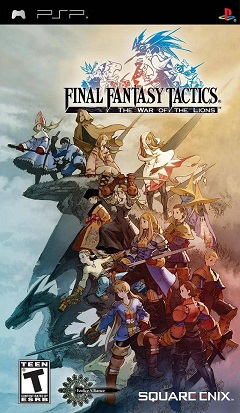
Final Fantasy Tactics: The War of the Lions is a tactical role-playing game developed and published by Square Enix for the PlayStation Portable (PSP). The game is an updated version of Final Fantasy Tactics made for the PlayStation, which was released in 1997.
David Sirlin is an American game designer and fighting game player.
Uncharted is an action-adventure video game franchise published by Sony Interactive Entertainment and developed by Naughty Dog. Created by Amy Hennig, the Uncharted franchise follows a group of treasure hunters who travel across the world to uncover various historical mysteries. The series features historical fiction, elements of fantasy and folklore, and fictional characters alongside real-world historical figures and events. In the main series, players control Nathan Drake; in the expansion, players control Chloe Frazer.
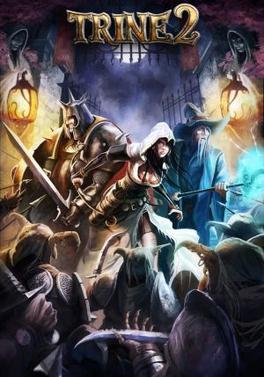
Trine 2 is a side-scrolling, puzzle-platform game developed by Frozenbyte. It is the sequel to Trine and was released on Microsoft Windows, OS X, PlayStation 3, and Xbox 360 in December 2011, and later for Linux in March 2012. Trine 2 allows three players to play the iconic roles of a wizard, a thief, and a knight in a simultaneous cooperative mode. A Director's Cut edition was released via the Wii U's eShop on the console's launch day in all regions except Australia and Japan. The game was also released as a launch title for the PlayStation 4 in North America and Europe in 2013. On February 13, 2019, it was announced that a port to the Nintendo Switch would be released on February 18, 2019.

Final Fantasy is a fantasy role-playing video game developed and published by Square in 1987. It is the first game in Square's Final Fantasy series, created by Hironobu Sakaguchi. Originally released for the NES, Final Fantasy was remade for several video game consoles and is frequently packaged with Final Fantasy II in video game collections. The first Final Fantasy story follows four youths called the Warriors of Light, who each carry one of their world's four elemental crystals which have been darkened by the four Elemental Fiends. Together, they quest to defeat these evil forces, restore light to the crystals, and save their world.

The Magic Circle is a video game developed and published by American indie team Question for Microsoft Windows, OS X, Linux.

SpellTower is a 2011 puzzle video game by Zach Gage in which the player creates words from a jumble of letter tiles to clear the screen before it refills. The game has several game modes and a multiplayer battle mode. The impetus for the game—the concept of combining elements from Tetris and Boggle in what was a prototype of the puzzle video game Puzzlejuice—inspired Gage to create SpellTower. The game released for iOS in November 2011 to generally favorable reviews. Versions for OS X and Android followed over the next two years. In 2017 SpellTower Minutes was released. This browser-based Flash game created special "blitz" like modes not found in the mobile releases. A new iOS version released in 2017 swapped out the unnamed dictionary and began using Merriam-Webster's Third New International Dictionary, Unabridged. French and Dutch language specific versions were also released. A 2020 release, SpellTower+, added new game modes, cleaner visuals, and a jazz soundtrack.

Victor Vran is an action role-playing video game developed by the Bulgarian independent development studio Haemimont Games. Victor Vran is published on Steam by EuroVideo Medien. It entered Steam Early Access in February 2015 and the final version was released in July 2015. The setting of the game resembles Gothic-fantasy fairy tale where both magic and science have a place in the world. The title exited early access on July 24, 2015. An updated port titled Victor Vran: Overkill Edition was released on PlayStation 4 and Xbox One on 6 June 2017, and a Nintendo Switch port was released on August 28, 2018. A version of the original game was made available for Amazon Luna on 20 October 2020.

Duck Game is a 2D action game developed by Landon Podbielski and published by Adult Swim Games. The game was released for the Ouya in 2014, and for Microsoft Windows in 2015. A PlayStation 4 version was released in August 2017, and a Nintendo Switch version was released in May 2019. A major update was released in November 2020 on PC, with an upcoming release on the Switch.
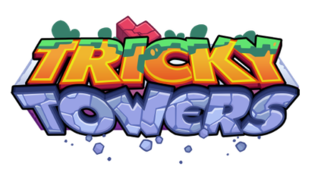
Tricky Towers is a physics based tower building game puzzle video game that uses a form of the block-stacking problem as the central game mechanic. It was released on digital distribution service Steam for Windows, OS X, and Linux, and for the PlayStation Plus service in August 2016, before being released on PlayStation 4 a month later. It was released on Xbox One on September 18, 2017, and on the Nintendo Switch on October 11, 2018.

The Harry Potter video games are a series of video games based on the Harry Potter franchise originally created by J. K. Rowling. Many of the Harry Potter-inspired video games are tie-ins to the novels and films of the same name. The main series features a video game for every novel, as well as two for the finale. There are multiple distinct versions for individual games.
















